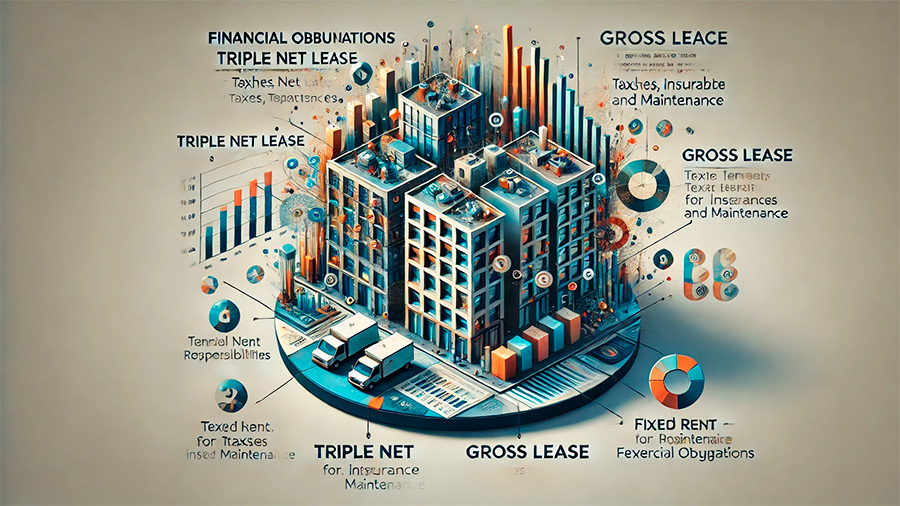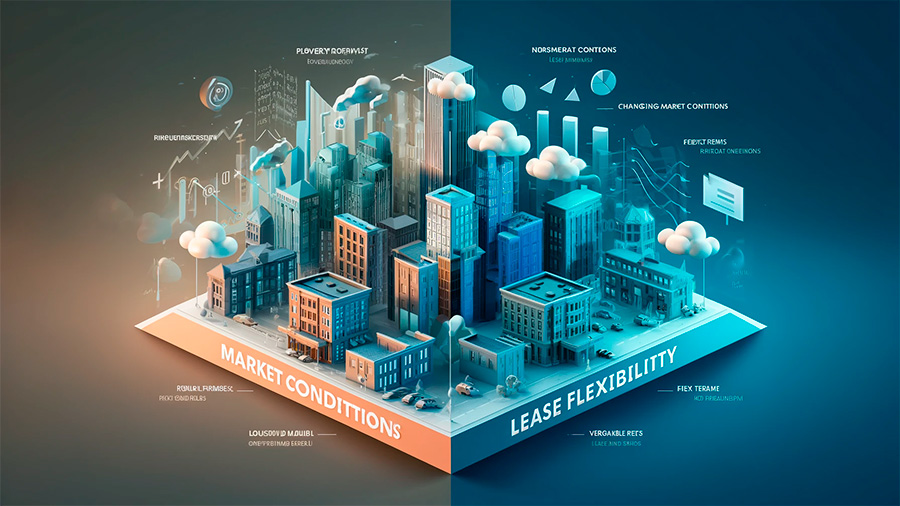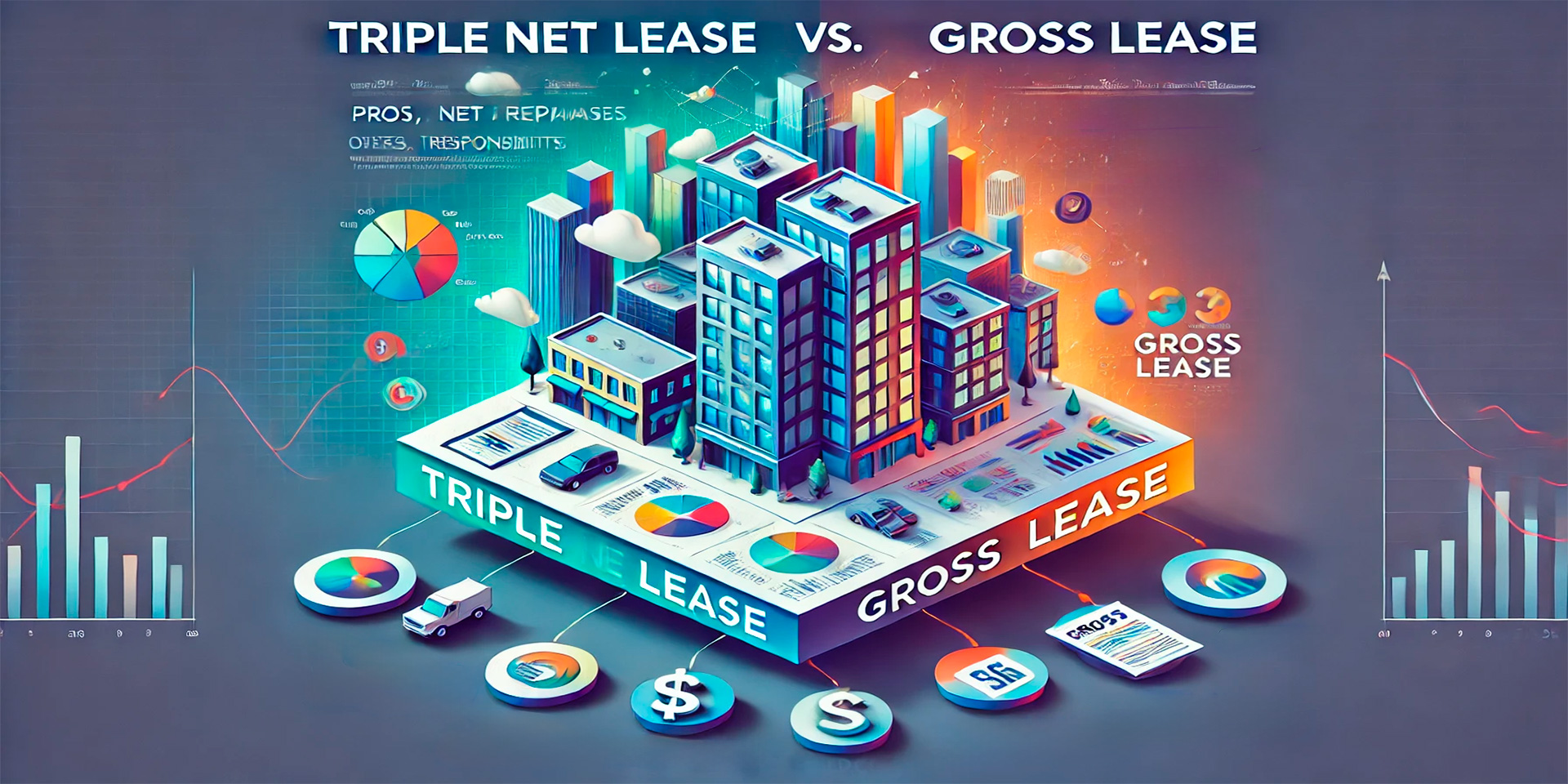When leasing commercial property, one of the most important decisions you’ll face is choosing between a triple net lease (NNN) and a gross lease. Each lease type comes with different financial responsibilities and can significantly impact your business’s cash flow and long-term obligations. Understanding the differences between these lease agreements is crucial for making the right choice for your business. This article explores the key differences between triple net and gross leases and how they affect your financial obligations.
What Is a Triple Net Lease?
A triple net lease, often referred to as NNN, is a commercial lease agreement in which the tenant assumes responsibility for three major expense categories: property taxes, insurance, and maintenance (hence the term “triple net”). In addition to paying rent, the tenant covers these additional expenses, making the landlord’s involvement in the property’s ongoing costs minimal.
Key Features of a Triple Net Lease
- Tenant Responsibility: In a triple net lease, the tenant is responsible for paying property taxes, building insurance, and maintenance or repair costs. This means the tenant takes on more financial responsibility beyond the base rent.
- Lower Base Rent: Because the tenant assumes these additional costs, the base rent in a triple net lease is typically lower than that of a gross lease. However, the tenant’s total monthly costs may fluctuate depending on the actual expenses for taxes, insurance, and maintenance.
- Potential for Cost Variability: One of the main characteristics of a triple net lease is that the total cost for the tenant can vary from year to year, depending on changes in property taxes, insurance premiums, or maintenance expenses. This can lead to unpredictability in cash flow, as these costs may rise over time.
For businesses, a triple net lease can be advantageous if the property is well-maintained and if the costs of taxes and insurance are stable. However, tenants should be prepared for the possibility of unexpected maintenance costs, which can add up significantly depending on the condition of the property.
What Is a Gross Lease?
In contrast to a triple net lease, a gross lease is a commercial lease in which the landlord assumes responsibility for most, if not all, of the property’s operating expenses. This includes covering costs such as property taxes, insurance, and maintenance, leaving the tenant with a fixed rent payment each month.
Key Features of a Gross Lease
- Landlord Responsibility: In a gross lease, the landlord handles the majority of the expenses related to the property. Tenants typically only pay their base rent, which means their monthly costs are fixed and predictable.
- Higher Base Rent: Because the landlord is responsible for the additional costs, the base rent in a gross lease is typically higher than in a triple net lease. However, the tenant does not have to worry about fluctuating expenses for taxes, insurance, or repairs.
- Predictability: One of the main benefits of a gross lease is the predictability it offers. Tenants can budget more effectively since their rent payment stays consistent each month, regardless of changes in property operating costs.
Gross leases are often preferred by businesses that value cost certainty and do not want to take on the financial risks associated with property expenses. It is especially appealing for businesses that are looking for a simplified lease arrangement where the landlord handles the operational responsibilities.

Financial Obligations: Triple Net Lease vs. Gross Lease
The primary difference between triple net and gross leases lies in how financial obligations are divided between the tenant and the landlord. Each lease type has distinct implications for your business’s cash flow and long-term costs.
Triple Net Lease: Greater Financial Responsibility
In a triple net lease, tenants take on a larger share of the financial burden. While the base rent may be lower, the additional costs for taxes, insurance, and maintenance can fluctuate over time. This makes budgeting more challenging, as unexpected expenses—such as a sudden increase in property taxes or a major repair—can cause financial strain.
However, for tenants who are confident in their ability to manage these expenses, a triple net lease offers greater control over how the property is maintained and operated. Additionally, because the base rent is lower, businesses may find it easier to secure a prime location for a lower upfront cost compared to a gross lease.
Gross Lease: Fixed Monthly Costs
A gross lease provides tenants with a simpler and more predictable financial arrangement. The rent is fixed, and the landlord covers the property’s operating expenses, making it easier for tenants to budget accurately and avoid unexpected costs. For businesses with tight budgets or those that prefer not to deal with fluctuating property expenses, a gross lease offers financial stability.
However, because the landlord assumes more responsibility, the base rent in a gross lease is typically higher than in a triple net lease. Over the long term, tenants may end up paying more in total costs, especially if the property’s operating expenses remain low.
Maintenance and Operational Control
Another key difference between triple net and gross leases is the level of control over property maintenance and operations. Depending on your business’s needs, one type of lease may be more advantageous in terms of operational flexibility.
Triple Net Lease: More Control, More Responsibility
With a triple net lease, tenants are responsible for the property’s maintenance and upkeep. This gives the tenant greater control over how the property is maintained, which can be beneficial for businesses that require specific modifications or maintenance schedules. For example, tenants can ensure that repairs are made promptly or that maintenance is conducted to meet their operational needs.
However, this level of control comes with added responsibility. Tenants must manage the costs and logistics of maintaining the property, which can be time-consuming and costly, particularly if the building requires significant repairs or upgrades.
Gross Lease: Landlord Handles Maintenance
In a gross lease, the landlord takes care of maintenance, repairs, and other operational responsibilities. This arrangement is appealing for tenants who do not want to be burdened with the day-to-day management of the property. For example, the landlord is responsible for fixing issues like plumbing or electrical problems, ensuring that the building remains in good condition without the tenant needing to intervene.
While this reduces the tenant’s responsibilities, it also means they have less control over how the property is maintained. Some tenants may find this lack of control frustrating, especially if they feel that the landlord is not maintaining the property to their standards.

Market Conditions and Lease Flexibility
The decision between a triple net lease and a gross lease can also be influenced by market conditions and the level of flexibility you need in your lease agreement. Understanding how each lease type operates within the current real estate market is important for making the right choice.
Triple Net Leases in a Competitive Market
In competitive commercial real estate markets, where property prices are high, a triple net lease may offer tenants a more affordable way to secure a prime location. With a lower base rent, businesses can move into desirable areas without the high upfront costs associated with a gross lease.
Additionally, because triple net leases often come with longer terms, tenants may benefit from a stable location over the long term. However, tenants should be prepared for the potential financial variability associated with property expenses in such a market.
Gross Leases for Cost Stability
For businesses that prioritize cost stability, especially in markets with volatile property prices or operating expenses, a gross lease can offer peace of mind. The fixed rent in a gross lease allows tenants to budget confidently without worrying about unexpected cost increases. This can be particularly important in uncertain economic conditions or in areas where property taxes or insurance rates are rising.
Additionally, gross leases may offer more flexibility for businesses that prefer shorter lease terms or that need the option to relocate without being tied to long-term commitments.
Conclusion: Choosing the Right Lease for Your Business
Deciding between a triple net lease and a gross lease depends on your business’s financial situation, operational needs, and long-term goals. A triple net lease provides more control over the property and can offer lower base rent, but it comes with additional financial responsibilities and cost variability. A gross lease, on the other hand, offers fixed costs and simplicity, with the landlord assuming responsibility for the property’s expenses, but it typically comes with a higher base rent.
By carefully evaluating your financial capacity, need for operational control, and the current real estate market, you can determine which lease type best aligns with your business’s needs. Whether you choose a triple net lease or a gross lease, understanding the implications of each will help you make a more informed and strategic decision for your business’s future.
